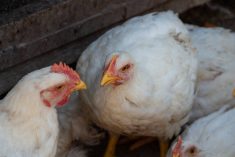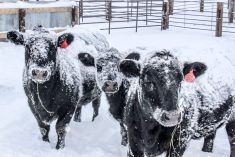The CFIA will no longer require three determinations of unconsciousness previously mandated for ritually slaughtered animals after a recent federal court ruling.
Jewish organizations and companies had appealed the Canadian Food Inspection Agency (CFIA) regulations in court, claiming they made kosher slaughter difficult, which resulted in a disruption in supply of kosher meat in Canada.
The applicants say the CFIA requirements reduced the supply of kosher beef by 55 per cent and veal by 90 per cent.
Read Also

Mosaic misses profit estimates on weak U.S. phosphate demand
Mosaic missed Wall Street expectations for fourth-quarter profit on Tuesday, hurt by a steep drop in U.S. phosphate fertilizer demand that weighed on sales volumes.
Federal regulations require that an animal be unconscious before it is hung after it is ritually slaughtered and that requirement will continue to be enforced the CFIA said in a note to ritual slaughter licence holders on Aug. 2.
However, three specific unconsciousness measures will no longer be enforced. They include:
- Absence of rhythmic breathing
- Absence of palpebral reflex (eye movement)
- Absence of corneal reflex
The CFIA had specific requirements around timed measurement of these indicators of unconsciousness, which were created in 2019 but weren’t enforced until June, 2023. The extra time to comply with the three measures has meant that some meat production licence holders have stopped ritual slaughter due to the decreasing in efficiency.
Animals that are conventionally slaughtered are stunned using gas or captive bolt, which are accepted methods of rendering an animal unconscious. The applicants argued that the three measures weren’t an indicator of unconsciousness, but of death.
Kosher and halal slaughter have other requirements around how animals are slaughtered, which don’t allow stunning before slaughter.
In the decision, Justice Guy Régimbald wrote in a decision released July 24 that the CFIA standards were unnecessary as there are other ways in which kosher slaughter had proved unconsciousness over many years and that the applicants’ rights to freedom of religion and equality under the Charter of Rights and Freedom were impaired.
The applicants were the Jewish Community Council of Montreal, Kashruth Council of Canada, Rabbi Abraham Banon, and kosher meat distribution companies Mehadrin and Shefa.















